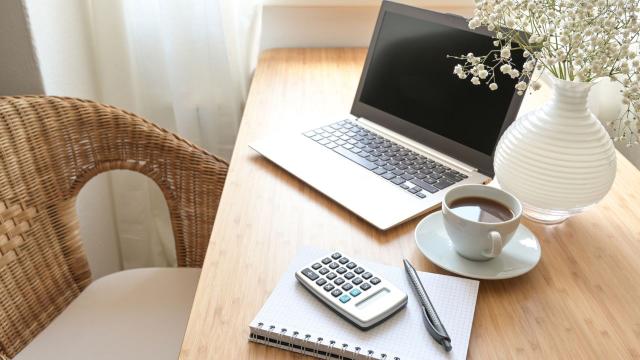With working-from-home conditions becoming the norm for a lot of us, whether full-time or in a hybrid capacity, it means we now have to factor these home expenses into our tax returns. But with the ATO changing the rules on WFH expenses yet again it can make doing your tax a little confusing.
To help make sense of this whole situation, Lifehacker Australia spoke with H&R Block’s Director of Tax Communications, Mark Chapman, about what you can and can’t claim and how these new changes will impact you.
The ATO’s new rules for claiming WFH expenses
The ATO is changing the way working from home deductions work, in particular the fixed rate method, which was introduced during the pandemic. Unfortunately, it’s not for the better.
“The fixed rate of 67 cents per hour no longer covers any form of depreciation of assets and therefore separate claims need to be made for depreciation,” Chapman explained.
“In practice, however, taxpayers will have bought and claimed all the equipment that they need to run their home office (desks, chairs, bookcases, etc) in previous years, due to COVID-19 lockdowns, and therefore they are unlikely to have a claim for these items.”
Chapman added that the fixed rate does include mobile phone and internet expenses, where previously a separate claim was possible. So if you use your mobile and home internet extensively for work you’ll be penalised as the additional deduction will be combined into the fixed rate.
“You can’t claim any separate deductions for items covered by the fixed rate and that means that if you want to claim actual mobile phone expenses, you must claim actual costs for all of the expenses covered by the fixed rate. Do you have sufficient records to claim actual costs? Probably not – so you’re forced to use the 67-cent fixed rate,” Chapman said.
To claim the fixed rate you’ll also need to keep a record of all the hours you worked from home starting March 1 2023. Additionally, taxpayers will need a four-week diary covering time worked from home between July 1, 2022 and February 28, 2023, as well as a copy of one bill for each WFH expense you are claiming.
“Taxpayers who don’t keep sufficient records from 1 March 2023 will not be able to claim the fixed rate, therefore it is important that taxpayers educate themselves as to how these new rules will work before that date,” Chapman said.
So what exactly does the fixed rate cover?
So what does that 67-cent-per-hour fixed rate method cover now that the ATO has made some changes? Here’s an outline as per Chapman:
- Energy expenses (electricity and/or gas) for lighting, heating/cooling and electronic items used while working from home
- Internet expenses
- Mobile and/or home telephone expenses, and
- Stationery and computer consumables
This means you’ll need to claim a separate deduction for any of the following expenses, if you’re using the fixed rate:
- Depreciation of office furniture and furnishings – eg chairs, desks, bookcases
- Depreciation of home office equipment – eg laptops, computers, tablets and mobile phones
- Repairs to any of the above
- Costs of cleaning the home office
Top tips for claiming work-from-home expenses in your tax
Now that we’ve all seen how complicated things can get with these new working-from-home tax changes, Chapman also gave us some tips on how to navigate them:
- Educate yourselves as to how these new rules work and the new compliance obligations. (You can read more on the ATO’s website here).
- Start keeping records: If you don’t have proof of how many hours you worked from home plus a copy of at least one bill for each of the expenses, you won’t be permitted to use the fixed rate.
- In good news for people working from small or crowded properties – the fixed rate will now be available where you don’t have a dedicated home office. So, if you work from the kitchen table or the lounge sofa, you can still claim the fixed rate. But, if you claim actual costs, you do still need a dedicated home office.
- What is the definition of working from home? Beware that the ATO won’t allow you to claim for minimal tasks such as occasionally checking emails or taking telephone calls while at home.
- If you live with your parents or others and don’t pay market rent to live in the property, you can’t claim. The ATO gives as an example, someone who lives with their parents and pays a token amount of board – they can’t claim even if they have a dedicated home office because they don’t incur any additional costs to work from home.
Don’t you love it when taxes become even more complicated? If you’re looking for more guidance this tax time check out some of the other advice we’ve received from Chapman on things you should be doing well ahead of the tax deadline and how to get more money out of your return.

Leave a Reply
You must be logged in to post a comment.